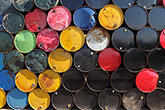MODEC enters into offshore carbon capture FEED contract with Samsung E&A
Published by Ellie Brosnan,
Editorial Assistant
Tanks and Terminals,
MODEC has entered into a front end engineering and design (FEED) contract with Samsung E&A for an offshore carbon capture pilot project, selecting Carbon Clean’s modular CycloneCC technology.
The study envisages the installation of a carbon capture module on a MODEC FPSO vessel as a pilot, and it will deploy CycloneCC in an onboard carbon capture setting.
Carbon Clean will provide FEED support to Samsung E&A, including equipment supply of the rotating packed bed (RPB) technology at the heart of CycloneCC, and process design package (PDP) licensing for the unit. Samsung E&A will perform detailed engineering to optimise CycloneCC for the offshore environment and FPSO’s boundary conditions.
CycloneCC is well suited to an offshore maritime environment, as the unit footprint is up to 50% smaller than conventional solutions, with its largest equipment sizes reduced by a factor of 10. The recently launched CycloneCC C1 series delivers a height reduction of 70% compared to column-based technologies. The RPBs will achieve enhanced capture performance under vessel motions compared to columns, making CycloneCC ideal for offshore operations.
Koichi Matsumiya, Chief Technical Officer at MODEC, said: “MODEC is proactively pursuing two targets through our R&D activities. One is to provide a stable energy supply to society with minimum greenhouse gas (GHG) emission, and the other is to prepare for new floater solutions to bridge society with alternative energies from oil and gas. We believe that the carbon capture technology proposed by Carbon Clean will be the key to achieve both of our targets. We will make our best efforts to progress the readiness level of this technology by utilising our experience at offshore and would like to materialise this technology at offshore in the shortest possible timeframe.”
Cheon Hong Park, Executive Vice President and Head of Sustainable Solutions Division at Samsung E&A, said: “Samsung E&A is thrilled to combine forces with MODEC and Carbon Clean on this carbon capture pilot project. This undertaking aligns with our company’s mission to address societal challenges through our technological solutions. We are confident that the execution of this project will play a key role in advancing MODEC’s mid-term decarbonisation plan, while accelerating the commercialisation of Carbon Clean’s CycloneCC technology. We look forward to strengthening our partnership for a cleaner, more sustainable future.”
Aniruddha Sharma, Chair and CEO of Carbon Clean, said: “Onboard carbon capture is essential for decarbonising offshore oil and gas operations. Our highly modular CycloneCC technology is 10 times smaller than conventional solutions, making it ideal for confined spaces, including floating vessels and maritime settings. Its replicable, scalable design makes it logistically and commercially viable to be deployed across a fleet at a fraction of the cost of traditional amine systems.”
The carbon capture project is in line with MODEC's decarbonisation strategy outlined in its Vision 2034 plan, specifically the goal of reducing CO2 emissions in its FPSO operations. Once complete, the next stage may include the installation of a commercial, scaled-up CycloneCC unit on MODEC’s FPSO fleet.
Read the article online at: https://www.tanksterminals.com/storage-tanks/27022025/modec-enters-into-offshore-carbon-capture-feed-contract-with-samsung-ea/
You might also like
Hydrocarbon Engineering Podcast
Peter Davidson, CEO of the Tank Storage Association (TSA), joins us to discuss the essential role that the tank storage sector has to play in ensuring supply security and resilience, as well as in facilitating the energy transition.
GlobalData: escalating Gulf conflict set to disrupt Hormuz oil flows
Jaison Davis, Economic Research Analyst at GlobalData, provides commentary on GCC exports, with global energy markets in flux.


